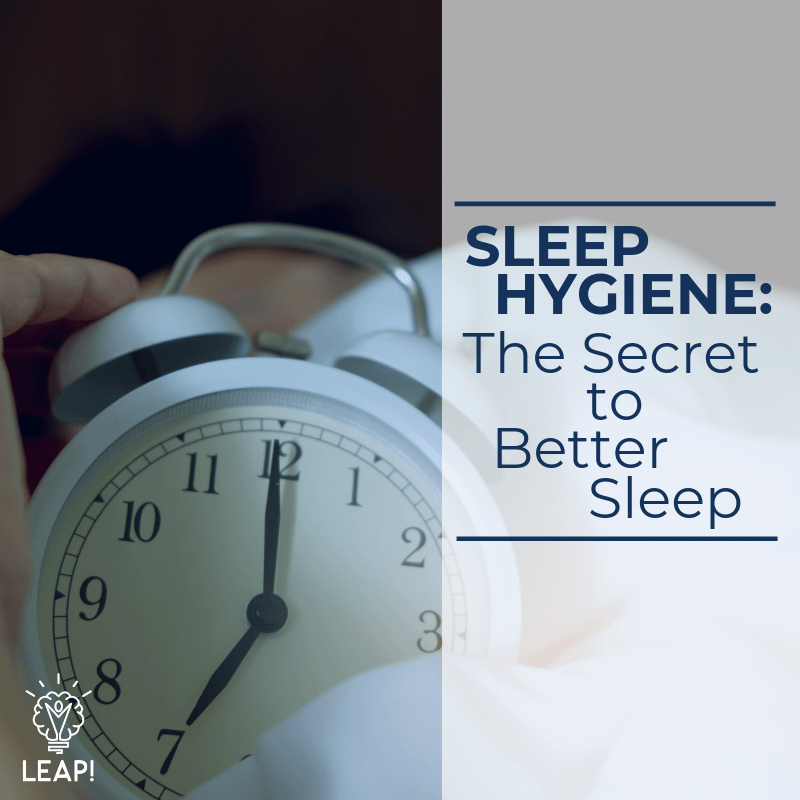Do you go to bed, fall asleep quickly, stay asleep all night, and wake up the next day feeling perfectly well-rested?
If you answered no, you aren’t the only one.
Restful sleep is hard to come by for many adults. In fact, one-third of Americans report sleeping less than the recommended 7 hours per night¹. Another 35% of Americans report their sleep quality as “poor” or “only fair,” even if they do sleep 7 to 9 hours².
And an estimated 50 to 70 million Americans live with a sleep disorder—insomnia or obstructive sleep apnea, to name a couple of the most common³.
Without a good night’s sleep we feel groggy, lack energy, and struggle to get through the day—and beneath the surface, the effects of poor sleep may be even more serious.
Unfortunately, sleep is complicated and doesn’t have a simple fix. However, we have some tips and tricks that may help. Forget counting sheep, we’ll teach you what you can start doing to get the quality sleep you need for an energized body and brain to attack your day!
Let’s start with the importance of sleep.
Most of us know—and can attest—that sleep loss can impair our ability to focus and think clearly. The chronic consequences of sleep deprivation, however, can increase our risk for obesity, diabetes, heart disease, and depression—all of which can increase our risk for AD⁴.
So what exactly goes on while we are sleeping that’s so important?
The short answer is: a lot.
Sleep improves our immune system, repairs our bodies, and helps our brain store memories. It also activates the glymphatic system⁵. Like the lymphatic system—which rids the body of toxins—the glymphatic system clears the brain of waste.
ꞵ-amyloid (Aꞵ), a protein associated with Alzheimer’s, is one of the products cleared by the glymphatic system. The concentration of Aꞵ in our brains is higher while we’re awake, but natural sleep promotes optimal function of the glymphatic system, leading to a clearance of Aꞵ⁵. This is just one of many ways that quality sleep may help reduce your Alzheimer’s risk.
One important aspect of quality sleep is sleep latency, or the amount of time it takes to fall asleep. One study on the relationship between this and Aꞵ suggests that longer sleep latency is associated with Aꞵ burden (i.e. our risk for cognitive impairment)⁶.
And if your sleep is disrupted throughout the night, you could also be at risk. In another study, a group of several hundred participants without dementia who experienced increased sleep fragmentation (waking throughout the night) developed a higher risk of AD and cognitive decline over time⁷.
So what can we do to not only get more sleep, but also fall asleep faster and improve the quality of our rest?
It all starts with sleep hygiene.
What exactly is sleep hygiene, you may be asking?
Sleep hygiene is an assortment of different techniques we can use to improve our quality of sleep—it’s prepping the body for a good night’s rest. We’ve detailed below some tips for better sleep hygiene, and why they’re important.
Line-Up Your Bedtime with Your Natural Clock
Crucial to sleep hygiene is lining up your schedule with your body’s natural biological clock—known as the circadian rhythm.
The circadian rhythm in humans is controlled by several natural mechanisms and external factors such as light, food intake, and physical activity⁸. According to the National Sleep Foundation, the circadian rhythm works best when we wake and go to sleep at the same time regularly.
Some people tend to be more alert later in the evenings and like staying up late, while others feel more energized earlier in the day. Whether you’re a “night owl” or a “morning bird,” try to schedule your daily events at times that will help you stick to a consistent sleep-wake pattern.
Develop a Routine
Developing a consistent, relaxing bedtime routine is also important. If your body gets used to a routine every night before bed, it will eventually start associating this routine with sleeping, which will help you fall asleep faster.
What should you include in your bedtime routine?
Good question. Let’s first discuss what you shouldn’t include.
We mentioned external factors that affect your body’s internal clock, one of those being the presence of light.
Light prompts the hypothalamus in the brain to activate a chain of responses, making you more alert. Blue light, which is emitted by LED light bulbs and electronic screens, is especially potent⁸. Exposure to blue light leads to a decrease in your brain’s release of melatonin, the hormone primarily responsible for initiating sleep.
But melatonin may be more than just a sleepy hormone—recent literature suggests that melatonin release could be linked to our protection against AD. Aside from signaling our bodies to rest, melatonin promotes the formation of new nerve cells, inhibits cell death, and reverses cognitive impairment caused by sleep deprivation⁸.
What does this mean?
Decreased levels of melatonin could increase your risk, so it’s important to avoid your cell phone, television, and tablet screens too close to bedtime. Doing so may help support healthy melatonin production and quality sleep⁸.
Aside from avoiding electronics, try to avoid excessive food intake and physical activity later in the evening as well.
Avoid eating large portions about 2 to 3 hours prior to bedtime. Digestion slows down while we sleep, so too much undigested food can lead to acid secretions that cause heartburn. A small snack before bed is perfectly acceptable though—we know it can be hard to fall asleep with a hungry stomach!
As for stimulating activity, such as exercise, we suggest avoiding moderate to vigorous exercise 2 to 3 hours before hitting the sheets, but don’t neglect to get that exercise earlier in the day. Daytime exercise can help boost your sleep quality, too.
Now we can discuss what you should include in your routine!
You want to wind down before bed, so choose activities that are relaxing. Try taking a warm bath, reading a book (not on a screen), or doing some meditation.
Have you heard of progressive muscle relaxation? It’s a means of relaxing the body by tensing and relaxing different muscle groups. PMR is simple because you can do it with no equipment and it doesn’t take long.
What about yoga? Yoga before bed can also be great to help you relax. Not only does it give your body a good stretch, which can help relieve tension, it helps you work on mindfulness as well. We like these poses from the Harvard Health Blog.
Regardless of what you choose to integrate into your bedtime routine, just make sure it isn’t overstimulating. The key is to prepare your body and brain to rest, not stress.
Focus on Your Sleep Environment
As important as it is to adhere to a routine, it’s just as important to make your bedroom your sleeping temple.
First, focus on your bed. This means using your bed only for sleeping, not eating, watching TV, or folding your laundry, etc. You want to train your body and brain to think that if you are in bed, you should be sleeping.
Be sure to care for your pillow and mattress, too.
Choose a pillow that is comfortable for you. You want your head and neck to be properly supported, and this may depend on the position you typically sleep in.
Additionally, make sure your pillow is still supportive. You can test your pillow by folding it, resting a shoe on top, and letting go of your pillow. If your pillow pops back into place, it’s good. If not, it may be time for a new one.
Your mattress also has a job to properly support the rest of your body while sleeping. The lifespan of a mattress depends on its type and how well you care for it, though an average lifespan is about 8 years. Remember to rotate your mattress every year or so to help it wear more evenly. Doing this will increase the longevity of your mattress and make it feel more comfy and supportive!
Next, limit excess light and noise. We detailed how detrimental blue light can be to your sleeping pattern, and noise can be near as harmful.
Certain levels of noise as you’re trying to fall asleep can lengthen your sleep latency, increasing this time by up to 20 minutes extra. While you sleep, noise can not only wake you up completely, but disrupt your sleep cycles as well⁹.
Specifically, short wave sleep (SWS) and rapid eye movement (REM) sleep could be compromised—two crucial sleep stages for brain health⁹.
To limit light, we suggest using light-blocking curtains, shutting off or covering devices that emit light, and even using an eye mask, if necessary.
As for limiting noise, we realize that sometimes this may be out of your control, but ear plugs can always be used to muffle any excess noise that may be keeping you awake.
Lastly, consider the temperature of your room—maintain a setting that is comfortable for you.
Turn fans on to keep your room cool, or keep extra blankets by your bed so you can have easy access to them if you like to stay warm. Remember how important it is for quality sleep to avoid bouts of waking up at night. The last thing you want is to struggle with being to hot or cold!
We hope this post not only gave you some ideas on how to improve your sleep hygiene, but also emphasized the importance of sleep—especially when it comes to brain health.
Just one night of sleep deprivation can lead to an increase in Aꞵ levels, one study found¹⁰. Thus, knowing that getting enough quality sleep can help reduce our risk of AD means that we need to make it a priority.
Set an alarm to remind you when it’s time to start getting ready for bed; adhere strictly to your relaxation routine; and invest some thought into creating your best sleeping cove. Soon, you’ll start feeling more energized, ready to conquer your day!
If you continue to struggle with getting enough rest, however, talk to your health care provider for more advice and alternate options—sleep disorders can be managed with the right treatment. But do take charge of what you can control, because that’s where change starts. Don’t forget to share your sleep success stories with us, too. Happy snoozing!
References:
1. Centers for disease control and prevention. (2017). Sleep and sleep disorders, Data and statistics. Retrieved from https://www.cdc.gov/sleep/data_statistics.html
2. National sleep foundation. (2014). Lack of sleep is affecting Americans, finds the national sleep foundation. Retrieved from https://www.sleepfoundation.org/press-release/lack-sleep-affecting-americans-finds-national-sleep-foundation
3. American sleep association. Sleep and sleep disorder statistics. Retrieved from https://www.sleepassociation.org/about-sleep/sleep-statistics/
4. Colten, H.R. & Altevogt, B.M. (2006). Extent and health consequences of chronic sleep loss and sleep disorders. Sleep disorders and sleep deprivation. Retrieved from https://www.ncbi.nlm.nih.gov/books/NBK19961/#top
5. Lule, X. et al. (2013). Sleep drives metabolite clearance from the brain. Science, 342(6156) pp. 373-377. doi: 10.1126/science.1241224.
6. Kang, D.W., Lee, C.U., & Lim, H.K. (2017). Role of sleep distrurbance in the trajectory of alzheimer’s disease. Clinical Psychopharmocology and neuroscience, 15(2) pp. 89-99. doi: 10.9758/cpn.2017.15.2.89.
7. Lim, A. S. P., Kowgier, M., Yu, L., Buchman A. S., Bennett, D. A. Sleep Fragmentation and the risk of incident alzheimer’s disease and cognitive decline in older persons. Sleep, 36(7) pp. 1027–1032. doi: 10.5665/sleep.2802.
8. Wu, H., Dunnett, S., Ho, Y.-S., Chang, R. C.-C. (2019). The role of sleep deprivation and circadian rhythm disruption as risk factors of alzheimer’s disease. Frontiers in Neuroendocrinology. doi: 10.1016/j.yfrne.2019.100764
9. Muzet, A. (2007). Environmental noise, sleep and health. Sleep medicine reviews, 11(2) pp. 135-142. doi: 10.1016/j.smrv.2006.09.001
10. Shokir-Kojori, E. et. al. (2018). ꞵ-Amyloid accumulation in the human brain after one night of sleep deprivation. PNAS, 115(17) pp. 4483-4488. doi: 10.1073/pnas.1721694115.




